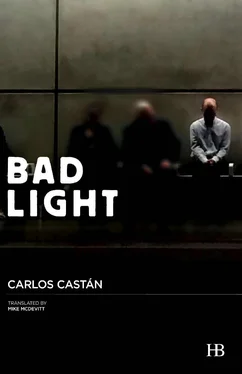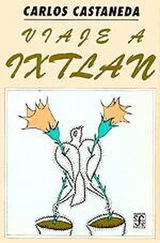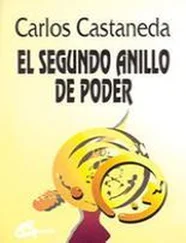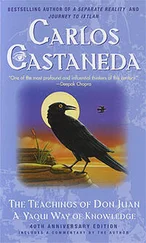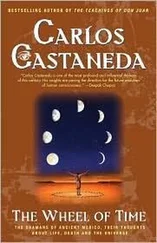Carlos Castán - Bad Light
Здесь есть возможность читать онлайн «Carlos Castán - Bad Light» весь текст электронной книги совершенно бесплатно (целиком полную версию без сокращений). В некоторых случаях можно слушать аудио, скачать через торрент в формате fb2 и присутствует краткое содержание. Год выпуска: 2016, Издательство: Hispabooks, Жанр: Современная проза, на английском языке. Описание произведения, (предисловие) а так же отзывы посетителей доступны на портале библиотеки ЛибКат.
- Название:Bad Light
- Автор:
- Издательство:Hispabooks
- Жанр:
- Год:2016
- ISBN:нет данных
- Рейтинг книги:5 / 5. Голосов: 1
-
Избранное:Добавить в избранное
- Отзывы:
-
Ваша оценка:
- 100
- 1
- 2
- 3
- 4
- 5
Bad Light: краткое содержание, описание и аннотация
Предлагаем к чтению аннотацию, описание, краткое содержание или предисловие (зависит от того, что написал сам автор книги «Bad Light»). Если вы не нашли необходимую информацию о книге — напишите в комментариях, мы постараемся отыскать её.
Carlos Castán
Bad Light
Bad Light — читать онлайн бесплатно полную книгу (весь текст) целиком
Ниже представлен текст книги, разбитый по страницам. Система сохранения места последней прочитанной страницы, позволяет с удобством читать онлайн бесплатно книгу «Bad Light», без необходимости каждый раз заново искать на чём Вы остановились. Поставьте закладку, и сможете в любой момент перейти на страницу, на которой закончили чтение.
Интервал:
Закладка:
Either way, the dejection into which that breakup had plunged me was due not so much to my perception of the present, which, truth be told, concerned me little at that point, but rather to the image it offered up of my own past, of every faltering step up to that point, in one fell swoop stripping them bare of any hope of meaning. There is a fairly universal, recurring childhood nightmare in which the child calls out to those dearest to him, his mother, his father, who nevertheless act as if they hadn’t seen him, talking to one another, going about their business, walking straight past him. This was quite similar, the feeling of shouting “it’s me, don’t you recognize me? I’m him, the same as ever, can’t you see me?” but having the eyes you’re seeking pierce straight through you without a second glance, like an unseeing sword, and your words sound just like those of a madman who dreamt the whole thing up, who made up a life no one can recall, one that rings false to the whole world, although your wrinkles are proof that, much to your regret, time has indeed passed. The dreadful part was not the sudden discovery that what I had for so long held to be the most important piece in the jigsaw of my life story had been plucked from my grasp, just like that, overnight, with such wounding ease, but rather the dawning realization that when something or someone truly ruins your life, it does so for good; we tend to think of our lost years in terms of the time left behind, but what is truly awful are the lost years that lie ahead. All that is to come will arrive more pallid and watered down, if not stillborn. I could now clearly see the enormous fragility of everything that had until recently appeared indestructible to my eyes. It was not being alone that pained me but rather the certainty that, one way or another, I now always would be, for I would be unable to see any woman who might at some point wish to approach me, no matter how naked, no matter how transparent her gaze, as anything other than the indifferent, absent-minded stranger she would sooner or later no doubt become, a stranger affecting to pretend that nothing really matters, that I never meant a thing, walking on different sidewalks in this city of mine, going in and out, at different times, of shops and bars I frequent, walking straight past my front door without even noticing, someone for whom I will one day have died without having died, much as I am now dead, without a funeral, without a homeland, barely a thing to call my own, in an asymmetrical parting of ways in which the burden of mourning lies only with the one who leaves — all of the tears are inside the casket, none are shed outside the coffin, out there springtime growls like a panther in heat and the time that remains calls to mind a party just about to begin.
And it’s hard to die sometimes, especially when beyond that dark frontier, on the other side of the barbed wire laid out in the shadows, in place of respite what lies in wait are once again the days and the weariness, the work, the air aching inside the chest. To leave and to remain, that’s the unbearable thing, to remain but to have left. As Celan put it in “Memory of France”: “We were dead and we could breathe.” Dead behind the gaze, which has not yet dimmed, behind eyes that continue to survey the stage, even when it now appears as barren as a snow-bound plain, a labyrinth in the form of an esplanade, or a ghost town with its dried-up water pipes, its abandoned train stations, the clumps of grass growing between the tracks, temples filled with cobwebs as if in a post-nuclear age, air of unwanted extra time, a handful of pages added slapdash to a worn-out tale. Dead, we sometimes run into others, perhaps also unsteady on their feet, groping their way in the dark, in a daze, as they roam their own invisible passageways in the midst of the fog, but we don’t even see them, we can’t see them, for this strange death, like the old Aristotelian god, is thought thinking itself, nothing but a feverish, obsessive loop.
Even so, there is something comforting in the idea of giving in to death, of relaxing one’s muscles at last after long days of titanic struggle and simply giving up the fight. Taking to bed to die is a splendid thing. Before you know it, the mind has sketched in the details of a hotel room, a receiver resting precariously atop a telephone on the bedside table, the scent of Chanel Nº5 on naked flesh. A crueler than cruel world on the other side of the window pane, a beautiful wound, a fragility that at long last gives in and succumbs to whatever may come, a gentle being that can take it no longer. In the adjacent bathroom, on the other side of a half-open door with white frames and golden doorknobs, stands a foam-filled tub, some of the candles on its rim still burning. When that mound of foam has finally gone completely cold, death will have arrived. In the meantime, only the pillow smelling of glycerin soap or the softener sold wholesale to the hotel chain. The watch still on the strap, the thin gold chain still slung around the neck, the breathing getting steadily deeper, dreams already flying over childhood streets, the escape attempts back then, a dilapidated grammar school in the neighborhood of Tetuán, the margarine and chorizo sandwiches made with yesterday’s bread, the waste ground where on Saturday mornings I would transform into striker José Eulogio Gárate, the thirst, the fruit trees in summer, the waterholes, the brambles, the scent of fig trees, their sap as thick as an ogre’s semen, the thorns of blackberry and rose bushes, knees stained with the red of Mercurochrome, the stones hurled in my direction, the homesick nights on Boy Scout camping trips (my city without me, far off, lit up in the middle of a plain, beyond those barren slopes, the interminable ranks of thickets and black hills under the moonlight), the sailor knots, the days that take their time, the bitter almonds. And also all that came in its wake: the insults, the vertigo and the nausea, the night as the realm of barking and eyes opened wide in the dark, behind every rock, hanging from the branches, watching from everywhere; the old, inevitable longing for every escape down endless highways or without moving from the spot, taking flight in the mind, throttling foes, smashing chains and locks in a rage, escaping from the fever, the aching bones, the shame; and the yearning, too, horribly insane, for all manner of poisons, hideouts, and underworlds, Bataille there, his verses borrowed one more time, one last time, tu es l’horreur de la nuit, je t’aime comme on râle , I love you as one might breathe one’s last. You are the immensity of the fear. To see reflected in the monster’s fangs the mouth you loved in times gone by, and in its claws the fingers of water that once sliced open your heart like a sweet blade. And Verrà la morte e avrà i tuoi occhi . And the vague sensation, in the watered-down images of delirium, that that which is dreadful is losing its bite while beauty sprouts claws and it is all much of a muchness and nothing truly matters any more.
That idea of slipping between the sheets, fresh from showering with the most expensive body wash, one last time, is not without its charm. One can snuggle up to it, that idea, hugging it as a child might embrace his rag doll in bed or an insomniac might clamp a sleeping pill beneath his tongue, with that same desperation and tenderness, and sensing the gentleness with which, from within, slowly, death washes over you. To erase, much like Borges’s suicide, every thing and the sum of all things: “Not a single star will be left in the night. The night will not be left.” To slowly forget it all, the blows, the slights, the most recent and the oldest scars, pink, hypertrophied. To sense the scent of Ruben Dario’s funeral wreaths drawing ever closer, the cold wax, the black velvet, and also Juan Ramón Jimenez’s birds, those that are going to stay, singing, beyond the window. And in the last instant to forgive God, to love the ruins for want of anything else, the waste left behind, the shards, the future like a treasure map burning in the bath, and to contemplate, with the indulgence that only weariness can give, with a gaze as tender as possible, the consummation of so much disaster.
Читать дальшеИнтервал:
Закладка:
Похожие книги на «Bad Light»
Представляем Вашему вниманию похожие книги на «Bad Light» списком для выбора. Мы отобрали схожую по названию и смыслу литературу в надежде предоставить читателям больше вариантов отыскать новые, интересные, ещё непрочитанные произведения.
Обсуждение, отзывы о книге «Bad Light» и просто собственные мнения читателей. Оставьте ваши комментарии, напишите, что Вы думаете о произведении, его смысле или главных героях. Укажите что конкретно понравилось, а что нет, и почему Вы так считаете.
